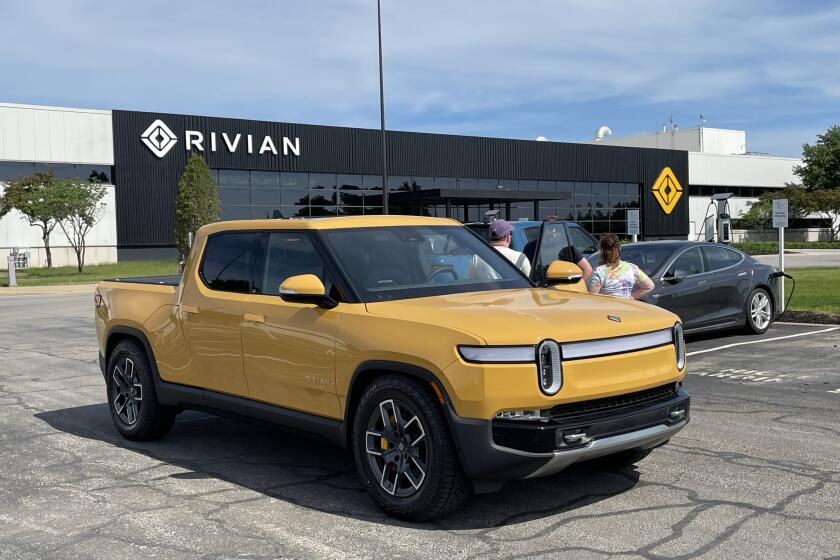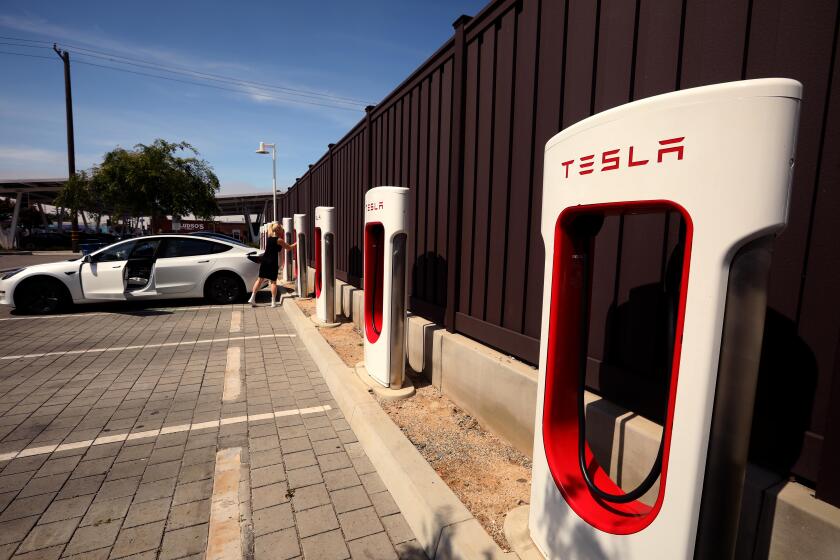Going East : As GM prepares to debut its new Saturn model, employees who relocated to the Tennessee plant from Southern California and elsewhere are happy that they made the move.
It’s a long way from the San Fernando Valley to rural Tennessee, and it’s even farther from the old General Motors to the new. Are these journeys worth it?
Jessie Rivera says yes, and his opinion is informed. He is among 2,800 auto workers from 38 states who have moved here during the past five years to help GM start over in the car-building business. The fruits of their labor, a new small car named Saturn, will be unveiled today.
Rivera, 34, has been joined by a couple of dozen other refugees from the troubled GM assembly plant in Van Nuys, all casting their lot with the auto company’s brave and costly new undertaking half an hour south of Nashville.
Not that they were giving up so much. A second-generation Californian from Fillmore, in Ventura County, Rivera had been laid off as often as not in the 11 years he spent at the Van Nuys plant. The scene of endless conflict between labor and management, the plant, which builds the Pontiac Firebird and Chevrolet Camaro, is considered a prime candidate for permanent shutdown.
On the home front, Rivera and his wife, Patty, a fellow California native, have fallen in love with Tennessee. It’s a familiar story: a better place for their four young kids to grow up, an economy that lets them buy their first house--four bedrooms and a full acre on a country road 20 minutes from work.
“It’s easier to be a kid in Tennessee,” Rivera says. To counter the lack of Mexican food, Patty Rivera has learned to make flour tortillas.
At work, Rivera is part of another familiar phenomenon: a domestic auto company’s effort to figure out a way to make cars just as well and just as efficiently as the Japanese.
But the Saturn project stands apart from other efforts along these lines because it is an all-American animal. The parts are 95% North American, and the car itself is the brainchild of GM veterans.
Key to this, everyone agrees, is the role of employees like Rivera and their relationship to the company and to the process of putting cars together. Saturn’s answer has been to create a decision-by-consensus company that, according to the UAW’s Mike Bennett, is unique in the world.
A one-time union militant from Flint, Mich., Bennett is president of Local 1853. His Saturn title, however, is manufacturing adviser. He and a counterpart from UAW headquarters in Detroit, Richard Hoalcraft, are full partners on the two top policy-making bodies at Saturn, and union members are key players on the two other policy boards that make up the subsidiary’s organization chart.
That gives union members--as well as other members of these councils--effective veto power over all sorts of decisions. The UAW could reject a proposed dealer for Saturn, for example. But, Bennett says, the union’s vote isn’t wielded that way.
“We’re another set of eyes and ears,” he says. “Unilateral decisions have more margin for risk. This has integrated the union into the decision-making process.”
Conspicuously missing from the union’s contract with Saturn, he notes proudly, is the paragraph in the national UAW-GM contract giving the corporation the sole right to hire, promote, fire or discipline employes.
One of the most striking elements of Saturn’s personnel system is that, beginning in a year, union and non-union employees alike will lay 20% of their salary on the line: That is the portion of their income they could lose if the cars they build aren’t of high enough quality or if other targets aren’t met. Conversely, they could earn up to 120% of their salary.
The starting point is the wages paid to GM workers at other plants.
This all makes sense to Rivera, who knows the old and damaging habits that developed over the decades at American auto factories.
“Here, labor is treated as an equal and not as a burden, as something to get rid of when sales are bad,” he says. “People are appreciated for their skills. Along with that, you take responsibility for your work. In Van Nuys, you don’t have to accept responsibility. You can just turn your brain off.”
Rivera says he is happy to risk 20% of his salary because everyone at Saturn faces the same risk and rewards. That is an important distinction to UAW members who resent the huge bonuses handed out to top executives even in poor years.
“Roger (Smith, former GM chairman) could get by with a terrible sales year and still get his bonus,” he said. “That won’t happen here.”



